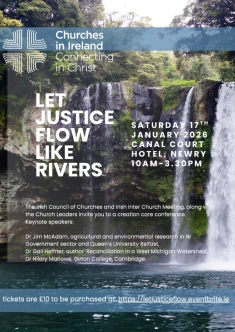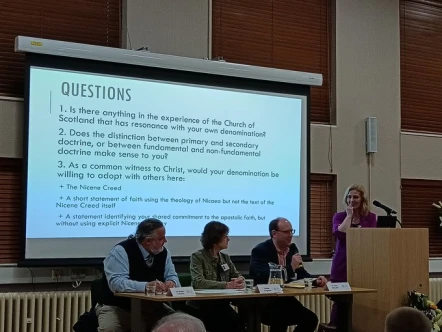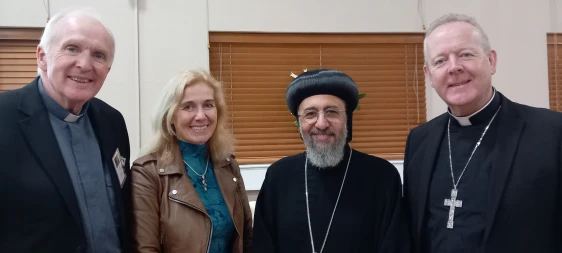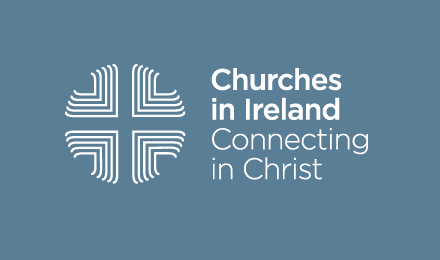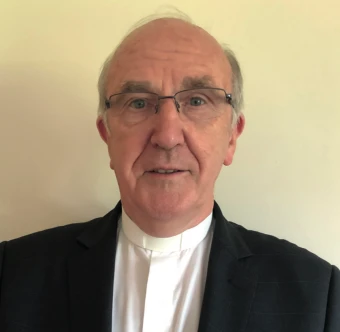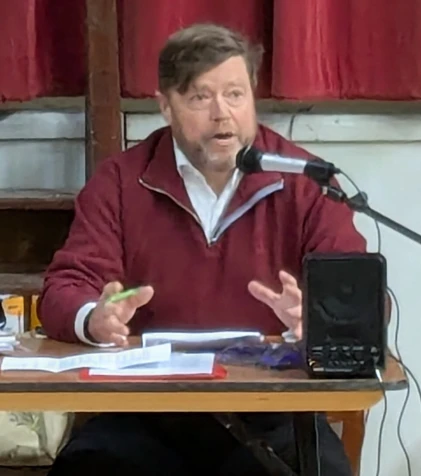
On 3rd April 2025 the Annual General Meeting was held in Centenary Methodist Church in Dublin. Professor Ben Tonra Ben gave the keynote address, attempting to analyse the question: Does the Church have a voice in the Public Square? Professor Tonra is Full Professor of International Relations at the UCD School of Politics and International Relations. Outside the university Professor Tonra is a Member of the Royal Irish Academy and has previously served as the chair of the Academy's Standing Committee on International Affairs. Professor Tonra kindly shared his notes with us for publication.
Irish Council of Churches
"The Church in the Public Square"
- Caveats and limitations
- Delighted to respond to invitation a week ago – so should be seen very much as a spontaneous response to a fascinating question
- Some engagement in the public square myself professionally
- Irish and EU foreign security and defence policy – broadcast and print media
- Also have a very limited experience of the Church’s efforts to engage
- Southern Executive of the Methodist Church’s Council on Social Responsibility
- Worked with the Church of Ireland’s committee on European Affairs
- Two immediate reflections
- Church and representation; on whose behalf does the Church purport to speak in the public square?
- Representing Christ’s witness to the world – in absolutist terms
- Bringing a Christian reflection to the interests of society as a whole
- Representing the views and defending the perspective of believers
- Church and power – be carefu/ bí cúramach
- Church’s proximity to state power – and its exploitation of that proximity to drive public policy indeed to control the public square – is strong in living memory on this island and gives rise to anxiety
- Deeper and worse historically if we think of the Church and its role in imperialism, colonialism, forced conversions, aggressive evangelism, antisemitism,
- Church and representation; on whose behalf does the Church purport to speak in the public square?
- Mapping the field
- Diverse global experience and practice: from defending itself and its members as a vulnerable and oppressed minority to being a potent – and aggressive national political force in its own right
- Church in chains
- US Evangelicals and Christian Nationalism: Russian Orthodox
- Working hand in glove with state power – presenting itself as vulnerable victim
- Diverse global experience and practice: from defending itself and its members as a vulnerable and oppressed minority to being a potent – and aggressive national political force in its own right
- Why do we seek to engage?
- a profound concern for justice, human dignity, and the common good. The Old and New Testaments are filled with prophetic calls to care for the widow, the orphan, the poor, and the stranger. Jesus himself declared good news for the poor and freedom for the oppressed.
- In that sense, the Church must be engaged. To ignore the suffering caused by inequality, poverty, or exploitation would be a denial of the Gospel’s social dimensions.
- More mundane and self-interested; defence of the institution and of the people of faith – free exercise of faith
- Issues to be considered
- Fragmented contemporary authority
- Ireland and much of Europe; more pluralist culture – giving rise to its own tensions ‘Ireland is a Christan Country’
- Translate religious traditions into general notions of national heritage, values and identity.
- Avowedly Christian perspective seen as old, outdated, authoritarian, sectarian The Church may be seen as just one voice among many, and often not the most welcome one.
- Church must learn to speak persuasively rather than prescriptively. Rather than saying “because the Bible says so,” we are called to frame our arguments in terms that make sense to people of different beliefs—grounding them in reason, compassion, and shared human experience.
- Ireland and much of Europe; more pluralist culture – giving rise to its own tensions ‘Ireland is a Christan Country’
- Political polarisation
- Public debate has become deeply divided. Issues like welfare, immigration, climate change, or economic justice are not just policy matters—they are battlefields in a wider culture war.
- When the Church enters these debates, it risks being pigeonholed. If a church speaks out on climate justice, some accuse it of being “left-wing.” If it speaks in favour of traditional family values, others accuse it of being “right-wing.”
- This politicization of everything makes it harder for the Church to be heard as a voice of conscience rather than a partisan actor. It must therefore work hard to maintain credibility as a community shaped by the Gospel, not by partisan politics.
- Internal divisions
- Let’s be honest—some of the challenges come from within the Church itself.
- The Christian Church is not monolithic. Within any congregation, there will be different political views, class backgrounds, and theological convictions. On issues like economic justice, migration, or sexuality, Christians often disagree—not just on conclusions, but on how to interpret Scripture and apply it to modern society. Own experience in Methodist Church
- Diversity can make public engagement difficult. How can the Church speak with a united voice when it is divided internally?
- “Faithful disagreement”—to model a better kind of dialogue, one that holds truth and love together.
- Church’s’ standing and reputation
- Church’s past failures: collusion with empire or colonialism, scandals involving abuse, and resistance to social progress.
- This history casts a long shadow. It can lead to public cynicism: “What right does the Church have to speak on justice when it has so often failed to practice it?”
- This is not a reason for silence—but it is a call for humility and I would argue apology. The Church must engage not from a place of repentance and renewal, recognizing its own need for grace.
- Complexity of Issues
- Social and economic questions are rarely black and white. Take, for example, the question of poverty. Christians agree that poverty is a moral problem. But what causes it? How should it be addressed? Is it best tackled through charity, government intervention, free markets, or structural reform= a mix of all?
- These are complex questions involving economics, sociology, and public policy—fields in which theology alone cannot provide all the answers and where each choice entails costs and benefits
- Church must focus on first principles; such as the dignity of the human person, the call to solidarity with the poor, marginalised and oppressed. But translating those principles into specific policies requires collaboration with experts and a willingness to listen and learn.
- Fragmented contemporary authority
- Opportunities for the Church
- In a world where many feel disillusioned by party politics and state institutions , the Church can offer moral compass. In a culture of noise and outrage, it can be a place of quiet reflection. In a society marked by inequality and division, it can be a community of radical hospitality and solidarity.
- And the Church does not need to shout to be heard- to PR itself. It speaks most powerfully when it is seen to live out what it proclaims—when it feeds the hungry, welcomes the refugee, visits the prisoner, and advocates for those without a voice.
- Some of the most transformative social movements in history have had Christian roots—from the abolition of slavery to the civil rights movement. That legacy is not over. The Church today still has a vital role to play—if it can find the courage to speak wisely, act justly, and love mercy.
- It means we must take seriously the call to public engagement—not as a quest for power and influence , but as a response to Christ’s command to love our neighbors.
- It means we must listen before we speak, seek understand before we argue, and work for the common good in ways that reflect the radical grace of the Gospel.
- It means we must act—not in isolation but in concert. With all churches and faith groups. With people of good will. With communities on the margins. And with the God who calls us to be salt and light in the world.
